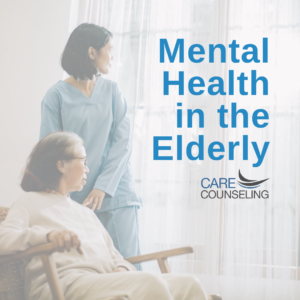Mental Health in the Elderly
 As we age, our mental health becomes increasingly important. Mental well-being is a fundamental component of overall health, and it’s a concern that affects people of all ages. However, in the elderly population, mental health issues often go unrecognized and undertreated. In this blog post, we’ll explore the unique challenges faced by the elderly in terms of mental health and discuss strategies for understanding and addressing common concerns.
As we age, our mental health becomes increasingly important. Mental well-being is a fundamental component of overall health, and it’s a concern that affects people of all ages. However, in the elderly population, mental health issues often go unrecognized and undertreated. In this blog post, we’ll explore the unique challenges faced by the elderly in terms of mental health and discuss strategies for understanding and addressing common concerns.
- The Importance of Mental Health in Aging
Mental health is integral to aging well. A healthy mind is essential for maintaining independence, coping with life’s challenges, and enjoying a fulfilling and meaningful life in the golden years. Unfortunately, mental health concerns in the elderly are often overlooked or dismissed as normal aging, when in fact, they can significantly impact a person’s quality of life.
Common mental health concerns in the elderly include depression, anxiety, cognitive decline, and loneliness. These issues can be exacerbated by physical health problems, social isolation, and life transitions like retirement and loss of loved ones. Understanding and addressing these concerns is vital for promoting the mental well-being of the elderly.
- Recognizing Depression and Anxiety
Depression and anxiety are two of the most common mental health concerns in the elderly. Recognizing the signs of these conditions is crucial for early intervention. Symptoms may include:
– Persistent sadness or low mood
– Loss of interest in previously enjoyed activities
– Changes in appetite and weight
– Sleep disturbances
– Fatigue or loss of energy
– Feelings of hopelessness or worthlessness
– Difficulty concentrating
– Restlessness or excessive worry
It’s important to remember that these symptoms are not a normal part of aging. They can often be successfully managed with proper diagnosis and treatment, which may include therapy, medication, or a combination of both.
- Cognitive Decline and Dementia
Cognitive decline and dementia are significant concerns in the elderly. While mild cognitive impairment is relatively common with age, more severe forms like Alzheimer’s disease can be devastating. Early diagnosis and intervention are essential to manage these conditions and enhance the patient’s quality of life.
Warning signs of cognitive decline may include:
– Memory loss that disrupts daily life
– Difficulty completing familiar tasks
– Confusion about time or place
– Changes in judgment or decision-making
– Withdrawal from social activities
– Mood and personality changes
Assessing cognitive health, seeking professional advice, and creating a supportive environment are key steps in addressing these concerns. Research also shows that mental stimulation, a balanced diet, and physical activity can help reduce the risk of cognitive decline.
- Loneliness and Social Isolation
Loneliness is a pervasive issue in the elderly population, and it can significantly impact mental health. As individuals age, they may experience loss of friends, family members, or partners, which can lead to social isolation. Loneliness has been associated with a higher risk of depression, cognitive decline, and physical health problems.
To address loneliness, it’s essential to encourage social engagement. This can involve participating in community activities, joining clubs or organizations, or connecting with peers through technology. Caregivers and family members can play a crucial role in combating loneliness by providing companionship and support.
- Loss and Grief
Loss is an inevitable part of life, and as individuals age, they often face the loss of loved ones, independence, and physical abilities. Grief and mourning are normal responses to these losses, but in some cases, the grieving process can become complicated or prolonged, leading to mental health issues like depression.
Understanding the grieving process and offering emotional support to the elderly is essential. Professionals, such as grief counselors or therapists, can provide guidance and therapy to help individuals work through their grief and develop healthy coping strategies.
- The Importance of Regular Check-Ups
Regular health check-ups are crucial for addressing mental health concerns in the elderly. Healthcare providers can perform comprehensive assessments, including mental health screenings, to detect any issues early on. Additionally, healthcare professionals can address the physical aspects of mental health, as conditions like vitamin deficiencies, medication interactions, or chronic illnesses can contribute to mental health symptoms.
It’s important for caregivers, family members, and elderly individuals themselves to communicate openly with healthcare providers about their mental well-being. Mental health should be an integral part of overall health discussions during medical visits.
- Creating a Supportive Environment
Creating a supportive environment for the elderly is a key element in addressing mental health concerns. This environment should foster a sense of purpose, belonging, and engagement. Strategies to consider include:
– Encouraging physical activity to maintain cognitive function and reduce depression.
– Providing opportunities for intellectual stimulation, such as reading, puzzles, or engaging in hobbies.
– Facilitating social interaction and companionship.
– Offering a balanced diet and encouraging proper nutrition.
– Ensuring a safe and comfortable living environment.
Understanding the common concerns that affect this population, such as depression, anxiety, cognitive decline, loneliness, and grief, is essential for early recognition and intervention. By recognizing the signs, seeking professional help, and creating a supportive environment, we can improve the mental well-being of the elderly and ensure that they enjoy their later years with vitality and contentment.



























